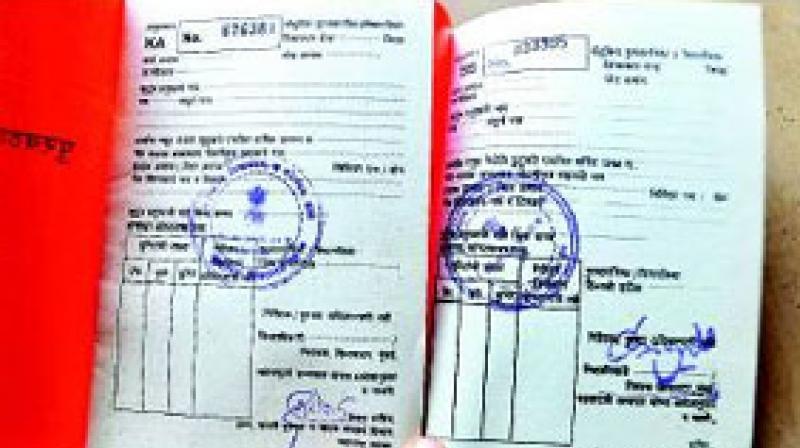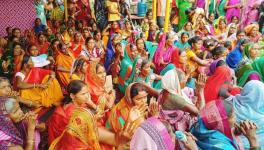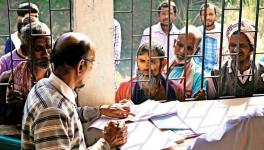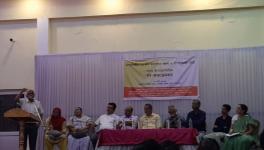Jharkand’s Poor Struck Off Ration Cards, Pensioners List, declared ‘Fake’

11,64,000 ration cards cancelled as ‘fake’; 2,71,000 old-age pensioners have been declared ‘fake’; pruning of MGNREGA applicants as ‘fake’
The Jharkhand government published a full page advertisement on September 22, enumerating its achievements during the 1000 days it has been in power. Among the ‘achievements’ there is one item in the list that details of how it has cancelled 11,64,000 ‘fake ration cards’ leading to saving Rs.225 crores. Similarly, the state government has also ‘cancelled; 2,71,000 old-age pension documents and saved Rs.86 crores. Again, the state government claimed that it has saved Rs.203 crores by pruning MGNREGA ‘fake applicants’. This is peddled like and appears to be a huge achievement of the govt.
But can such ‘saving’ be at the cost of the deprivation of deserving families?
News reports trickling in from interior villages tell a different story. Volunteers of ‘Right to Food Campaign’ found out that several poor toiling people are being denied rations saying their cards are ‘fake’. When these families complained to concerned officials, they were told because they did not have Aadhaar Card, while the Minister for Food Supplies has given a clear directive that not having Aadhaar Card should not be an excuse for not giving rations to the deserving poor. One wonders whose orders are being obeyed by local officials!
Dheeraj Kumar, a volunteer working in Khunti district of Jharkhand, has the following to say about how Aadhaar is being used to circumvent PESA Act which gives constitutional powers to Gram Sabhas:
“ I would like to add few things about the exploitative character of Aadhar. What Modi government is presenting as a magic wand to end corruption and saving revenue, is in fact another weapon of exploitation of poor in the hand of officials, endangering their minimal food security provisioned in National Food Security Act. Aadhar based biometric authentication system is already creating exclusion and inconvenience in PDS, now the cancellation of ration cards just because they were not linked with Aadhar number may lead to starvation of poor, marginalised and voiceless people. We have been told by villagers that they have submitted Aadhar card several times to dealer but still their ration cards were cancelled. It raises question whether the Aadhar has become another instrument of arbitrary use of power by the state against the poor and voiceless, bypassing the constitutional power of PESA?” [emphasis added].(Dheeraj Kumar by email, 4 October.2017)
Who decides who the deserving beneficiaries are? It should be, as per law, the respective Gram Sabha.
The PESA Act, 1996, declares: “every Gram Sabha shall be responsible for the identification or selection of persons as beneficiaries under the poverty alleviation and other programmes”. [PESA 4.(e).(ii)]. This power of the Gram Sabha cannot be overridden by any other govt machinery. After all, it is common sense that the members of the Gram Sabha not only know every single family in their village but also know the economic and social condition of each family. Hence Gram Sabha is the most competent body to decide which families deserve govt’s special assistance to carry on their life in a humane way. On the other hand, the govt servants/officials are not only outsiders but also generally have no concern for the well-being of the poor. But alas, they have usurped the powers of Gram Sabha. This is illegal and unjust.
Unfair arbitrary imposition of ‘digital’ exercise on a largely illiterate population: 2011 national survey reveals in Jharkhand only 54% of male tribal and 27% of female tribal are literate. That means about half the male tribals and two-thirds of female tribals are illiterate. This is the sad reality after 70 years of independence! Now to impose a highly technical digital system on them in unfair and unjust. Added to this is the fact that 56% households in Jharkhand are not yet electrified, and although most villages are electrified the supply is only for limited hours. There are other factors such as whether the computer is functioning or whether the computer-operator is present etc.
Lastly, despite the (last) SC ruling that Aadhaar Card is voluntary, in practice it has been made compulsory. The poor, illiterate rural folk in interior villages are the casualties of state government’s arbitrary action.
Disclaimer: The views expressed here are the author's personal views, and do not necessarily represent the views of Newsclick.
Get the latest reports & analysis with people's perspective on Protests, movements & deep analytical videos, discussions of the current affairs in your Telegram app. Subscribe to NewsClick's Telegram channel & get Real-Time updates on stories, as they get published on our website.
























